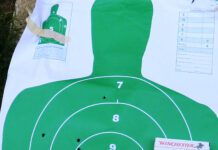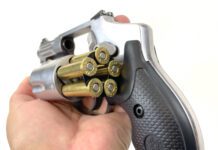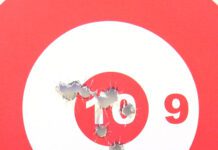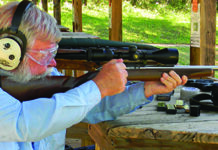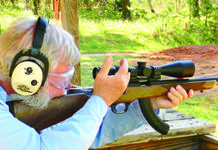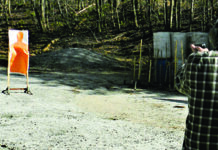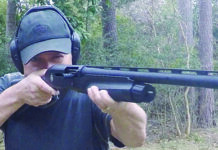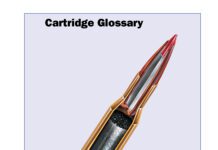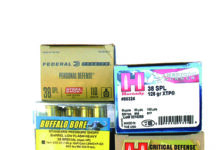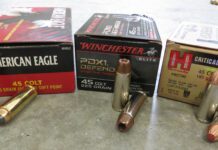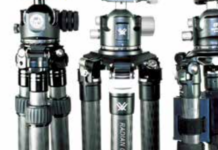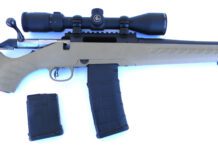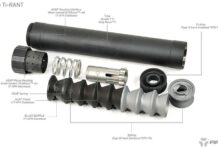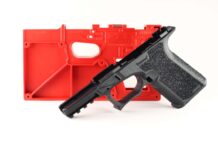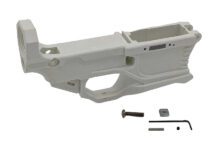Winchester SXP Marine Defender 512268395 12 Gauge
Winchester 1200 Defender 12 Gauge
Simple, Effective 12 Gauges: Shot-guns with a Little Bling
No, you don't ‘need' the copperhead scales of the Iver Johnson, the lustrous finish of the Mossberg Retrograde, or the minimalist stainless-and-black appearance of the RIA M5. But they are fun.
Budget 20-Gauge Pumpguns: H&R, Mossberg, Remington
Short Shots: December 2017
Following the success of the 590 Shockwave 12-gauge pump-action firearm, Mossberg has released a 20-gauge version (50657) of the 590 Shockwave, priced at $455 MSRP. Featuring a 14-inch barrel, "birds head" pistol grip and an overall length of 26.4 inches, the 590 Shockwave does not fall under the purview of the National Firearms Act (NFA) and does not require additional paperwork or the payment of a tax stamp for transfers. Federal Law does require the purchaser of this firearm to be 21 years of age.
Over-the-Counter Exotics from Mossberg and Century Arms
Pumpgun Showdown: Remington 870 Vs. Norincos Wild Bunch
The 12-gauge shotgun remains the most effective home-defense weapon available. While some prefer the handgun for convenience or the 223-chambered rifle for low recoil, all give a nod to the awesome power and simplicity of the pump-action shotgun. The shotgun is also the most common home-defense weapon for non-firearms-passionate individuals. Everyone should learn to use a tool well. But the home-defense shotgun is often treated with the same respect and purpose as the spare tire and jack in the vehicle. If we need it, it is needed badly, but otherwise we tend not to think about it. Non-gun folks, including far north aviators and sailors, keep a shotgun handy just in case they have to deal with angry animals or bad people. As long as the pump-action shotgun is in good repair and functions well, the exact choice may not be as important as the terminal ballistics. But there are differences in handling that are interesting, and every advantage should be taken.
We decided to look at the subject of a number of reader requests for reports on affordable pump-action shotguns. Some used guns are out of production, and others are earlier versions of popular shotguns. Some are just used and only a few months old.
We picked two popular shotguns, including one of the most popular ever made, the Remington 870. We counted this as a good deal. It's very similar to a shotgun Remington still offers through its law enforcement side, the 870P Standard pump action.
We also found a used Norinco Wild Bunch shotgun for $299 at the same outlet. It was as new and also counted a good buy. But that isn't the whole story—they were purchased months apart, one for a backup truck gun and the other as a Wild Bunch Cowboy gun. Naturally, they were thrown together by the raters from time to time, and the question came up about how suitable the Wild Bunch gun was for home defense. The owner answered by saying it was already his favorite home defender despite a safe that held more-modern guns.
When you are looking at older pump-action shotguns, the concerns include maintenance, supply of parts, and perhaps ergonomics. When you look at the handling of the shotguns and the sights, well, it is what it is. There are a few add-ons for the Remington, but we might as well purchase a more highly developed shotgun in the beginning if that is what is desired. So, we stuck with the shotguns as issued and took at hard look at each for personal defense. The results were interesting, and in the end we respect both shotguns, but have greater respect for just one.
Shotgun Shootout: Self-Loader, Pump, or Dual-Action Design?
When we decided to test three tactical shotguns suitable for home defense, rather than test three pumps or three self-loaders, we tested one of each, and one that could be either. The Benelli Nova Tactical Pump was our first type, followed by a semi-auto Mossberg 930 Tactical and TriStar's TEC-12, the latter of which can operate as a pump or semi-auto. If we were jumping into the sandbox at the moment, we think the Benelli M3 might be our choice, especially after firing the near clone of it, the TEC-12. However, the team thought the Benelli Nova pump had the simplest action to use well, and for us, its performance could not be faulted. The Mossberg 930 Tactical had its advantages as well, among them being it was the most comfortable shotgun to fire and use. We had our preference, as we describe below, but you may decide one of the others is better for you. To make that decision easier, our shooters went over the three guns with an eye toward finding flaws, and before we begin in earnest, we will say we found few problems, and that any of these three would do good duty for home defense.
We have had generally good luck with Benelli's Nova variations over the years. Way back in July 2007, we tested the field-grade Benelli Nova Pump 12 Gauge and gave it an "A-" for its overall performance, the feel and function of the synthetic stock and forearm, and its selection of choke tubes, which was impressive for this bargain-priced firearm. Then in the October 2013 issue, we tested a Benelli Super Nova Tactical No. 29155 12 Gauge. That gun earned an "A-" grade, losing out to a less expensive Stevens 320 that was every bit as good as the Super Nova and hundreds of dollars cheaper. Also, that Tactical Super Nova was the heaviest of those shotguns, which can be good or bad depending on the shooter and the load. But in that test, our shooters particularly liked the feel of the grooved polymer forearm and pistol grip. Downside: The out-of-the-box trigger pull of 8.75 pounds was too hefty for our tastes. Functionally, however, the Super Nova was fine. Those same likes carry over to a Benelli Nova H2O, which features a nickel-plated barrel, that we have not worked into a head-to-head against other corrosion-resistant units. Functionally, it has felt and operated like the other Novas we've tested, but the unit we've been shooting off and on (No. 20090, $669 MSRP) for a couple of years has open rifle sights (blade front and rear notch), which we don't like as well as the Ghost Ring sight on the Nova Tactical, and the price is a big step up from the plain black Benelli. At the time of this test, GanderMountain.com listed the H2O at $650, not including shipping and other charges such as FFL receiving fees. If you need the anti-corrosion features, you may be willing to pay the premium price for it, but for us, because of the price and the sights, we'd have to call the H2O a "B" in terms of value.
Home-Defense Shotguns: We Compare Three Pump Actions
The shotgun is seen by many as the best choice for personal defense and especially home defense. The most powerful portable shoulder-fired weapon used for self preservation, the 12-gauge shotgun offers a multiple-projectile load that has been proven effective in close-quarters defense. With slug loads, it is even suitable for defense against large, dangerous animals. In rural defense, there are plenty of deadly predators in the country, feral dogs, mountain lions, and other dangerous animals that only an aggressive counterattack will stop. But without proper firearm and load selection, as well as training, the shotgun will be underutilized. More than one citizen has defended himself with the shotgun, and common sense tells us that we should have one in the home.
In this test, the shotguns we chose are among the best in their price range. The choices range from a pedestrian bead-sighted model to a tactical model with an AR-15 type stock. While self-loaders rule the day at 3 Gun competitions and are very reliable, a dirty pump will work when a dirty automatic will not. We have seen self-loaders malfunction during our test programs, and we know the pump-action shotgun is relatively easy to master, as long as you get quality training so you're confident in your skills and sure in your manipulation.
With this in mind, we chose three likely shotguns for home defense. The top end of the budget was $450, but we would prefer to spend less to get a good pump-action gun, if we could. We fired them with practice loads, home defense loads, good loads suitable for pest and predators, and slugs suitable for defense against large animals. We used five different loads for testing these shotguns. We tried to find the most economical offerings in bulk. This included the Fiocchi 12HV75 birdshot ($97 for 250 shotshells from CheaperThanDirt.com) Fiocchi 1-ounce Aero slugs ($8.10/10 from VenturaMunitions.com), Hornady 86240 Critical Defense 00 buckshot loads ($11.08/10 from CheaperThanDirt.com), Hornady's Varmint Express, a load using 24 pellets at 1350 fps ($16/10 from Gandermountain.com), and Winchester 3-inch 12-gauge 00 buckshot loads (No. XB12300VB, $17/15 from CheaperThanDirt.com) This selection covered the likely uses for personal defense, predators, and even large animals. Each shotgun was fired with 50 birdshot shells, 10 of each of the buckshot loads, and 10 Fiocchi slugs, for a total of at least 90 shells per gun. This is punishing work and was not accomplished in a single range session. We fired mainly the light-kicking birdshot to learn how to function the guns quickly and determine their smoothness and ergonomics.
Here are the results.
In Search of the Best 12 Gauge
For those who are not in restricted states, magazine-fed shotguns can quickly switch from sporting uses to home defense and competition with some minor adjustments. In the November 2012 issue, we test-fired four high-capacity products with an eye mainly toward effective home defense, which is often done with shotguns that hold 5, 6, 7, and 8 rounds, usually in tubular magazines under the barrel. But there are bigger-capacity shotguns out there, so we examined the Akdal Arms MKA 1919 3-Inch 12 Gauge, a Red Jacket Saiga RTS-SBS-12 Short-Barrel 12 Gauge, the Kel-Tec KSG 3-Inch 12 Gauge, and the Saiga IZ-107 12 Gauge.
The KSG (Kel-Tec Shot Gun) was a bullpup pump shotgun whose short overall length tallowed for greater maneuverability, making it suitable for close-quarters combat. The KSG weighed a shade over 7 pounds and measured only 26.1 inches in length. The internal dual tube magazines held an impressive 14 rounds of 12 gauge 2 3⁄4-inch shells (seven per tube) or 12 3-inch rounds (six per tube). Because different types of loads can be placed on either side, the shooter can switch between tubes depending on his needs. There are many good fighting shotguns on the market, but no others are quite as handy and possess as much firepower as the Kel-Tec KSG, we found.
Another recommended shotgun from that test, and our favorite, was an older Saiga 12, graded as in Very Good used shape. It was manufactured at the Izhmash Factory in Russia and imported through EAA Corp. What we believe is an identical gun, the IZ-107 12 Gauge, is available from K-Var Corp. of Las Vegas (K-Var.com). Designed as an all-purpose shotgun, the Saiga comes with a chrome-lined barrel, which allows the use of many different types of ammunition, including steel. This shotgun was manufactured utilizing the Kalashnikov gas system, which reduced felt recoil dramatically over the KSG pumpgun. The Saiga shotgun was capable of cycling both 2 3⁄4- and 3-inch magnum shells. As with all Saiga 12s, this shotgun is not designed to use low-pressure shells. Saiga 12 gauges now come standard with a bolt hold-open feature, which allows for quicker magazine changes.
Since our last test, market availability for the Saiga 12 has tightened, making these shotguns difficult to come by and rather expensive — Gunbroker.com prices average around $1300 for an Izhmash-branded Saiga. We wanted to see how a Saiga-style shotgun, but made in China at less than half the price, would hold up to the real thing, so we acquired Catamount Fury and Fury II shotguns and put them through similar tests as the Izhmash Saiga. Here's what we found.
12 Gauges: Side-By-Side, Double- Barrel Pump, and Tri-Barrel Guns
Meeting or exceeding the needs of modern day double-gun enthusiasts seems to be a driving factor in some of the recent offerings by firearm companies that stretch the bounds of innovation. Tagging along on this trek into a bold new world, we have responded to reader requests by examining three 12-gauge double-gun selections that range from old school to double gun plus to double gun on steroids. The three shotguns in this test are the TR Imports Silver Eagle side by side; the Chiappa Firearms Triple Threat three-barrel break open; and the Standard Manufacturing DP-12 double-barrel pump action. All three shotguns carry a price tag in the moderate to high price range — $1297 for the Silver Eagle; $1,599 for the Chiappa; and $1699 for the DP-12. Because they are all double guns of one sort or another, we tested them both as self-defense firearms and as possible clay busters, and we graded them for both categories in what certainly may be one of the most unusual match ups in Gun Tests history.
The distinction between a shooter's tools and a shooter's toys is sometimes hard to determine and often depends upon an individual's access to expendable income. In the arena of double-barreled shotguns, this distinction has been kicked into what some would call novelties, with the introduction of smokepoles that stretch the bounds of creativity.
The three 12-gauge shotguns we tested included a TR Imports Silver Eagle Ptarmigan side by side; a Chiappa Triple Threat three-barrel break open; and a Standard Manufacturing DP-12 double-barrel pump action. The DP-12's action was to pump once, then shoot twice.
Evaluating the shotguns, we gave equal footing for their effectiveness on both paper and clays. Admittedly, there was a little head shaking and comments of "What were they thinking?" in some cases, but each of the shotguns was treated with equal respect on the range. For our shooting evaluations, our test ammunition included Winchester 2.75-inch Sabot Slugs pushing 400-grain slugs at 1450 fps; Royal Buck 2.75-inch loads of nine pellets of No. 00 buckshot with an average muzzle velocity of 1345 fps; and Remington ShurShot Heavy Dove 2.75-inch loads of 1 1/8 ounces of No. 6 shot with an average muzzle velocity of 1,255 fps. In addition, we tested each firearm on clay targets with Nobel Low Recoil 2.75-inch loads moving 7/8 ounce of No. 8 shot at an average muzzle velocity of 1200 fps. We encountered no misfires with any of the loads, although the Silver Eagle failed to eject several of the heavy loads during the self-defense testing. Here are our findings:


